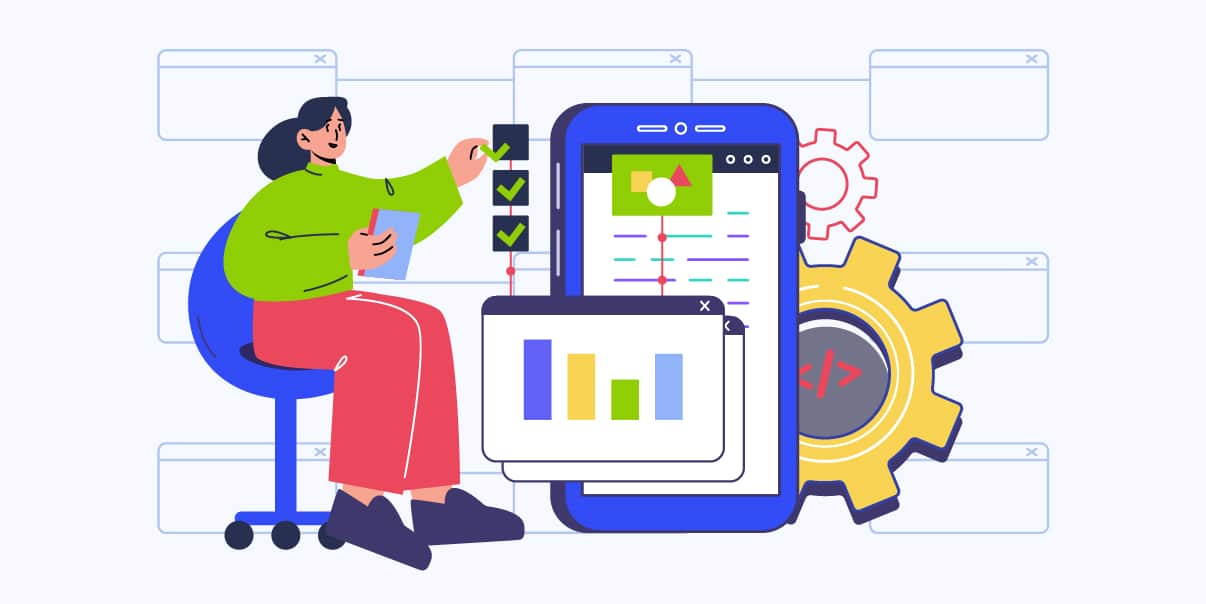10 Best Choices for a Mobile App Development Platform

As technology continues to evolve, businesses must adapt to remain competitive. Having web and mobile applications is no longer an option but a necessity.
Building an app can be daunting, especially when you’re unfamiliar with the development process. It’s a must that you understand your options before choosing a mobile app development platform.
We listed ten of the best choices for a mobile app development platform to assist you on this journey. This guide will help your team decide which suits your project requirements and budgets best.
Before we get to that, let’s start with knowing what a mobile development platform is and why you should use it.
What Is a Mobile App Development Platform (MADP)?
A comprehensive mobile app development platform lets developers create custom applications quickly. MAPDs come with a cloud-based IDE plus a variety of app templates, components, and APIs. Developers can design unique projects using the integrated development environment (IDE).
A mobile application platform has pre-built integrations and frameworks for building algorithms. Developers can use them to deploy their apps to the App Store or Google Play.
Keep in mind that a development platform is different from a development framework. Mobile development platforms are comprehensive suites of app tools. On the other hand, frameworks provide the structure and code libraries that mobile developers use to build apps.
Types of Mobile App Development Platforms
Developing apps has become necessary for businesses to stay competitive. Mobile application development platforms simplify the development process as they help create apps quickly. There are three main types: no code, low code, and full stack.
No code
If you want to create mobile apps but don’t have coding experience, choose no-code mobile app development platforms. They provide an easy-to-use drag-and-drop interface, which allows users to design apps from scratch, requiring no programming. They also come with an array of features. No code platforms have backend development tools, templates, and analytics.
Low code
Low-code mobile app development platforms are slightly more complex than no-code platforms. They provide unique mobile development solutions that require minimal coding knowledge. Low-code platforms have a library of app components, analytics, and backend services. Its features make building apps more streamlined and efficient.
Full stack
Full-stack platforms are the most complex of the three categories. They offer flexibility for developers. Full-stack platforms also provide access to APIs, backend services, app templates, and other development tools. They also come with an integrated development environment (IDE). IDE allows developers to build apps from scratch or customize existing applications.
Why Use a Mobile App Development Platform?
Mobile app development platforms have become increasingly popular over the past few years, particularly with the rise of custom app development companies. They provide businesses with a cost-effective way to build mobile applications quickly and easily. Companies can create robust, feature-rich mobile applications with a mobile app platform. Here are six reasons companies should use one.
1. Cost-effective
Mobile development platforms are cost-effective. Businesses can create mobile applications without additional coding or programming expertise. They help save costs since you don’t need to purchase software, reducing overhead costs.
2. User-friendly
MADPs are user-friendly. New platforms offer drag-and-drop features that make it possible to build mobile apps quickly and intuitively.
3. Cross-platform compatible
You can create cross-platform mobile applications that you can use on multiple devices and operating systems.
4. Time and Effort Savings
MADPs allow teams to develop their mobile apps faster. Developers won’t need to write code from scratch. Moreover, companies won’t need to outsource the work to expert developers who charge hefty fees for custom projects.
5. Scalability & Flexibility
Mobile app development platforms offer scalability and flexibility. As your business grows, you can easily add new features or change existing ones without significant changes in the codebase. Building your app in an MAPD allows you to meet customer demands quickly. You won’t need extensive technical knowledge of software engineering principles.
6. Security
MAPDs have built-in security measures. Mobile platforms have encryption, authentication protocols, and secure data storage. With a mobile app platform, you can protect sensitive data associated with your mobile application.
Now that you understand the advantages of a mobile development platform, let’s look at the top platforms available today.
Top Mobile App Development Platforms and Why You Should Use Them
From industry mainstays to up-and-coming tools, we’ve compiled a list of the top ten mobile app development platforms.

Visual Studio
Visual Studio supports all mobile operating systems, including Android, iOS, Windows Phone, and more. It has IntelliSense technology that offers fast and powerful auto-completion and code refactoring options for mobile developers.
Visual Studio is also highly extensible and customizable. It helps mobile app developers add third-party plugins and tools to enhance the mobile app development process. Visual Studio has an integrated debugger that allows you to test your apps on different devices.
Zoho Creator
Zoho Creator lets you create enterprise-grade hybrid apps for Android and iOS devices. It’s one of the most popular tools for building apps today because you can use it without coding knowledge. You can choose from the templates available and customize them according to your needs.
Firebase
Firebase is an excellent choice for mobile app developers who want a quick, easy way to start app development. It’s also a perfect option for companies looking for a platform that can quickly scale as their needs grow.
Firebase offers many features. It includes user authentication, cloud storage, crash reporting, remote configuration, and analytics. The platform also supports multiple programming languages, including Java and JavaScript. It makes it easy for developers to integrate Firebase into their apps without learning new tools or technologies.
Google Android Studio
Google Android Studio is a free, open-source IDE for Android development. It comes with tools that make it easy for developers to write code and debug their applications. The most important features of this platform are the code editor and the debugger.
The code editor supports syntax highlighting, auto-complete options, and code refactoring features. It also offers advanced features like real-time error checking and debugging. The debugger allows users to monitor program behavior as it executes; this helps in finding bugs in the application.
Appcelerator Titanium
Titanium gives you access to over 3,000 native APIs and 100 components. It’s open-source and free to use, with plans starting at $29/month.
It’s easy to get started with this platform: download it, set up your account, and start coding! There are no restrictions on who can use Titanium—it works on any operating system and is available through GitHub.
Companies that used Titanium described its user interface as “simple” and “intuitive.” Developers of all skill levels get comfortable using it quickly.
AWS Amplify
AWS Amplify helps you build and operate apps at scale. It provides a complete set of cloud services, analytics, and user interface components.
AWS Amplify runs on top of React Native. It gives you the same benefits as React Native: a single codebase across all platforms that uses standard JavaScript. You can also use your existing React Native skills to create new apps quickly and easily.
In addition to helping you build apps faster and easier, AWS Amplify also makes it simple to manage user data and configurations in the cloud. It lets you add new features without worrying about updating your backend infrastructure. You won’t need to pay for additional services or software licenses.
Apple Xcode
Xcode allows you to build iOS, tvOS, and watchOS apps. It is also able to compile your code in Swift or Objective-C languages. The platform has been around since the launch of Apple’s first iPhone in 2007.
Apple designed and wrote it in C++. Because of this, Xcode became one of the most powerful iOS app development platforms. It supports Swift, Objective C, and C++ programming languages. Xcode is an ideal solution for all developers, regardless of their preferred language.
Developers prefer Xcode because it is fast and reliable. It has an interactive debugging feature that helps developers troubleshoot issues quickly.
Apache Cordova, aka PhoneGap
PhoneGap is a popular cross-platform app development platform. Companies use this platform to build native iOS, Android, and Windows Phone applications.
The main advantage of PhoneGap is that you can use HTML, CSS, and JavaScript to develop your application. You can create user interfaces with web standards. Then, you can access the native APIs of the device to add mobile-specific features like location services or offline storage.
You can also use PhoneGap Build to create apps for multiple platforms simultaneously, saving time and effort.
Appery.io
Appery.io is a powerful B2B mobile application development platform. It lets you build your enterprise apps and develop native and hybrid apps for iOS and Android. You can create your backend APIs and connect with the tools you already use with Appery.io.
The platform also offers collaboration features such as version control, live chat, task management, and more. It has an intuitive drag-and-drop UI that makes it easy to build your app without any coding knowledge required.
Appy Pie
Appy Pie enables you to create your mobile app without coding. The platform allows you to build Android and iOS apps. It also has a wide range of features that help you create a fully functional app with minimal effort.
Appy Pie offers features like push notifications, in-app purchases, in-app messaging, cross-promotion, and many others. The platform also allows developers to test their cross-platform apps before publishing them on the App Store or Google Play Store.
Factors To Consider When Choosing a Mobile App Development Platform
There are various factors to consider when deciding on the ideal development platform for your business. The right platform can help enterprises quickly and efficiently develop mobile apps.
Support
Support ensures that you can resolve issues that may arise during the app development process. The platform should provide access to knowledgeable support staff, technical documentation, and tutorials. Additionally, it should give timely upgrades and regular bug fixes. Support can be instrumental in helping you understand how best to use the features of your chosen platform. This way, you can create highly effective mobile applications.
Security
It would be best to consider security to ensure your mobile applications are safe from malicious attacks or data breaches. Mobile applications store, process, and exchange user data. The data includes sensitive contact information and financial details. As such, mobile app developers must take appropriate measures to ensure the safety of such data.
Integration
Integration is essential to ensure your app can connect to other mobile platforms, such as the Apple App Store and Google Play. It allows you to access additional features and services that can improve your app’s performance and user experience. For example, you can integrate mobile applications with analytics tools, payment services, and social media platforms for increased user engagement.
Costs
In addition to the features and services, you must consider the cost of developing mobile applications. Mobile application development costs can quickly increase if you don’t consider the budget and the features you need. Therefore, choose mobile app platforms that provide cost-effective solutions for your specific needs.
Monitoring and Analytics
This feature helps you understand user behavior better. With these tools, you can track user engagement. It also shows how long users use your application and which features they interact with most often. The monitoring and analytics feature is good because it helps developers know the areas that need improvement.
Scalability
When selecting a platform, you must consider scalability. It is because mobile applications often grow in complexity over time. By choosing a scalable one, you can ensure their mobile applications remain effective and efficient even as they expand and scale up. You need to be able to add features, services, and tools to your mobile app over time to keep up with the latest technologies.
You can easily choose a platform for your project when considering the abovementioned factors. The best mobile app development platform can help you develop applications that meet your objectives.
Conclusion
Mobile app development platforms are becoming popular. Businesses looking to expand their digital presence need them. With the right platform, you can build an engaging mobile experience quickly and easily without starting from scratch.
With so many different platforms available, it can be challenging to determine which will best fit your needs and budget. We listed the top ten mobile application development platforms and highlighted their capabilities. Whether you’re looking for a comprehensive suite of tools or want something simple, we hope one of them meets your requirements.
Selecting the right mobile app platform depends upon understanding your project type. It is also important to note how much time and money you are willing to invest in its creation. If you need expert advice, BIT Studios can help!
FAQs
Which platform is most famous for Android Apps?
The most popular platform for Android apps is Google’s official Android Studio. This all-in-one app development software. It enables mobile developers to create and test native and hybrid mobile applications on Android devices. Android Studio has an easy-to-use interface, debugging support, and robust performance profiling tools.
Android Studio is an ideal choice for developing high-quality android applications. With its built-in native libraries, cloud integrations, and A/B testing capabilities, it is no question that it is one of the most comprehensive platforms available today.
Which platform do developers prefer for iOS Apps?
The most popular platform for iOS apps is Apple’s Xcode. This platform has a built-in storyboarding tool, Apple’s Interface Builder, and Swift programming language support. Xcode offers an easy way to build iOS applications that developers can deploy through the App Store.
Additionally, it supports device testing with access to virtual simulators and real devices connected directly via USB or WiFi networks. Xcode is one of the best platforms for developing stunning iOS mobile apps.
Which platform do developers prefer to use for Hybrid Apps?
Apache Cordova, which also goes by PhoneGap, is the most used platform for developing hybrid mobile apps. It allows developers to build native mobile applications using HTML5 and JavaScript. Cordova provides access to device functions such as geolocation, camera, and notifications. You can integrate it with other major frameworks, like Ionic. Its easy deployment across multiple operating systems makes it an excellent choice for hybrid mobile app development. Hybrid applications are faster to market than traditional native mobile apps.
How many mobile apps can I build with an app builder platform?
The number of custom mobile applications you can build with an app builder platform depends upon the platform’s features. Some platforms offer tools for creating a basic mobile application, while others provide advanced features. Generally speaking, mobile app developers can use an app builder platform to build up to five mobile applications. However, mobile developers can also purchase additional mobile app development software to increase the number of mobile apps they can create using the platform. Additionally, mobile developers can use their existing code on multiple mobile app development platforms for a more cost-effective solution. Software developers can use mobile app builders.
What are the different types of MADPs?
There are three mobile application development platform types. These include low-code, no-code, and full-stack.
Low-code mobile app platforms enable mobile developers to create mobile applications with minimal coding knowledge required. No-code mobile app development platforms allow business users to build mobile applications without coding skills. Full-stack mobile app development platforms are comprehensive solutions that provide mobile developers with various tools and features to build mobile applications. It includes mobile backend development, user interface design, and integration with third-party services. The best mobile app development platform will depend upon the specific needs of your mobile application project.
We’re BIT Studios!
At BIT Studios we specialize in designing, building, shipping, and scaling beautiful, usable products with blazing-fast efficiency



